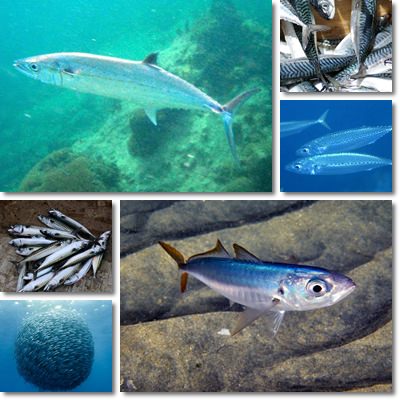Mackerel is a fish species related to tuna and one of the best sources of healthy Omega-3 fatty acids. Aside from its oily meat rich in healthy fats, mackerel is an excellent source of nutrients such as vitamins A and D, both essential for immune system health. The species provides important amounts of phosphorus, magnesium and potassium, further promoting bone health and providing cardiovascular benefits. Being a great source of protein and iron, mackerel is an ideal food for building and maintaining muscle and boosting energy.
There several species of mackerel fish, all belonging to the Scombridae family. The true mackerels include the Atlantic mackerel (Scomber scombrus), the blue mackerel or the Pacific mackerel (Scomber australasicus), the chub mackerel (Scomber japonicus), the Atlantic chub mackerel (Scomber colias) and the short mackerel (Rastrelliger brachysoma). The Spanish mackerels include species such as the king mackerel (Scomberomorus cavalla). Other fish species resembling, but not related to mackerel may also be called mackerels and are commonly mistaken for the real species.

Mackerel packaging format. Mackerel fish is available fresh, frozen or canned. Because there are benefits and disadvantages to each option, here is what you need to know about each packaging form.
1) Fresh mackerel. You can get fresh mackerel at the supermarket or at the fish market if you live by the sea. However, mackerel is a species known for its fast spoilage and chances are if it’s not freshly caught, it might already be spoiled. If you want to get fresh mackerel, learn to identify spoilage signs.
How to tell if fish if fresh. You can recognize a fresh fish by its eyes which should be bright and clear. If your mackerel has no head, then it’s probably because the fish is no longer fresh and the head was removed in order to hide this. Next, look at the meat. Fresh mackerel meat should have a vivid, shiny appearance. If the meat looks dull, then it’s probably not fresh anymore. The gills are also an important indicator: Again, the color should be vivid. Anything too dull looking is not a good sign. And lastly, something we can all recognize: bad smell. If the fish smells bad, it’s not good anymore.
2) Frozen mackerel. Because it’s a fish that spoils rapidly, frozen mackerel is a good option. The main advantage of this packaging form is that freezing destroys fish parasites and their eggs, meaning your mackerel should be safe to eat. Even more, freezing preserves the nutrients in the meat and the flavors of the fish for the most part.
3) Canned mackerel. In the debate of frozen vs canned fish, canned might just win. Canned mackerel is a good option because the meat has been sterilized by heat processing at temperatures above boiling point, which destroys bacteria and intestinal parasites makes it safe for consumption. The fact that the fish meat is hermetically sealed in the can allows it to sit on your shelf for some years, adding to the benefits. Special attention is paid to mackerel because of its fast spoilage and the fish is to be kept in excellent conditions prior to canning. Mackerel is often canned in brine, in olive oil, usually olive pomace oil, in sunflower oil or tomato sauce.

What are the health benefits of eating mackerel?
Mackerel is highly prized for its content of healthy Omega-3 fatty acids which account for most of its benefits. Also, the fish species is an important source of several vitamins and dietary minerals as well as protein. Here are the top 7 benefits of eating mackerel:
1) Rich in Omega-3. Mackerel contains two forms of Omega-3 called EPA and DHA, found only in animal food sources. Both forms exhibit strong antioxidant and anti-inflammatory properties and hold important uses for skin, brain and nervous system, cardiovascular system and immune system health. Also, mackerel has a great Omega-3 Omega-6 ratio, providing an estimate of 11 to 15 times more Omega-3 than Omega-6. However, exact amounts may vary depending on species, origin and other factors.
2) Mackerel brain food. The form of Omega-3 called DHA found in fish like mackerel helps build cell membranes, including those of nervous system cells and gray matter, meaning it is physically part of our brain, hence the reason it is a dietary requirement. In children, Omega 3 helps with brain development, while in the elderly, it maintains normal brain function and prevents cognitive decline. Some studies theorize it can even reduce the risks of degenerative nervous system diseases like Alzheimer’s. Amino acids help synthesize neurotransmitters (like serotonine) which in turn help improve mood, reduce stress, boost energy levels, regulate sleep and appetite.
3) Benefits for skin. With its excellent content of vitamin A, vitamin E and Omega-3 fatty acids, mackerel contributes to skin integrity, helps skin retain moisture and remain elastic whilst ensuring a healthy glow. The antioxidant properties of vitamins A and E and Omega-3 also protect the skin against oxidative stress and wrinkles.
4) Good for arthritis inflammation and cardiovascular health. Mackerel has strong antioxidant and anti-inflammatory properties and consumption may help reduce arthritis pain and swelling and protect against cardiovascular diseases. The Omega-3 forms in fish have been shown to lower blood pressure, reduce LDL cholesterol and triglyceride levels, help prevent lipid oxidation and atherosclerosis and improve blood circulation.
5) Immune system benefits. Mackerel contains important amounts of vitamins A and D, both immuno-modulating micro-nutrients that help support and enhance the body’s defenses. The vitamins help in the differentiation, activation and proliferation of several types of white blood cells, regulate antibody production and reduce inflammatory responses, all of which help improve immune system function.
6) Good for bone health. Mackerel contains important amounts of vitamin D, phosphorus and magnesium, three essential nutrients for strong, healthy bones. Vitamin D stimulates the absorption of calcium from food and maintain good bone density. Phosphorus triggers the process of generating new bone and is physically part of our bones and teeth, meaning a good dietary intake is necessary for bone integrity. Magnesium is also physically part of our bones and influences calcium and vitamin D metabolism.
7) Great source of protein. Mackerel is a good source of quality protein that helps build and maintain muscle. Furthermore, the amino acids that form proteins play numerous roles in brain and nervous system health and synthesize neurotransmitters, contributing to better sleep, improved mood and appetite and more energy.
What are the side effects?
Mackerel and mercury content. Mackerel is a fish species known to contain methylmercury. However, not all mackerel contains the same amount. For example, the smaller species have been shown to have less mercury because they are at the base of the food chain and, as a result, don’t accumulate as much from their food source. The larger mackerels do have more because of the higher volume of food they consume, allowing them to accumulate more of the toxin (they are fish-eating fish).
Mackerel and pregnancy. Typically, fish is healthy and provides balance to any diet when consumed in limited amounts. Mackerel in particular is one of the healthiest options available, but because of concerns raised about its mercury content, pregnant women and small children are advised to avoid consumption for fear of side effects. Talk to your doctor more about whether or not you should eat mackerel during pregnancy.
Mackerel allergy. Mackerel allergy is when spoilt mackerel accumulates histamine and consumption of the spoilt meat leads to food poisoning. Because histamine is an organic element that is not necessarily destroyed by cooking, it is possible for the spoilt fish to make you sick even if it’s well cooked afterwards. Symptoms of mackerel allergy include: rash, redness, nausea, diarrhea, swelling of the tongue, breathing difficulties. Mackerel allergy should be treated like any allergic reaction and warrants medical attention, with treatment options depending on the evolution of symptoms.
Mackerel parasites. Like many fish, mackerel too may contain worms and parasites. Avoiding raw fish, cooking the fish well (boiling in particular), freezing the fish for at least one week at around -20 degrees Celsius or eating canned mackerel can prevent any infestation with intestinal parasites.
